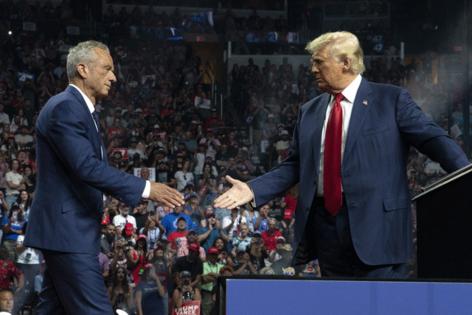Lisa Jarvis: RFK Jr. will not be good for America's health
Published in Op Eds
Any illusions that Donald J. Trump would back away from his last-minute embrace of Robert F. Kennedy Jr. were shattered during his victory speech, when he assured his supporters that the anti-vaccine activist was “going to help make America healthy again.”
Some observers had hoped that Trump would discard his former rival for the presidency now that his endorsement had served its purpose. Instead, the president-elect suggested Kennedy would have wide latitude on the nation’s health agenda, saying, “Go have a good time, Bobby.”
What that means in practice is hazy. Will Kennedy be given a formal leadership role at the department of Health and Human Services or might he sit inside the White House as some sort of health czar? Regardless of the title he ends up with, it’s clear that Kennedy is enjoying an influence that could fundamentally undermine the tenets of evidence-backed medicine and public health during the second Trump administration.
In recent weeks, Trump echoed a number of Kennedy’s proposed health policies on the campaign trail, including banning fluoride in water, which he has falsely called a neurotoxin linked to lower IQs, and getting rid of certain childhood vaccines (an ambition Kennedy since has backed away from, though not without implying the public deserved more safety and efficacy data to make more informed choices about vaccines — despite reams of freely-available safety and efficacy data).
And while Kennedy indicated in an interview on Wednesday with NBC that his exact role was still being settled, he said his mandate from Trump was to clean up “corruption” at health agencies, restore “gold-standard science, empirically-based, evidence-based medicine,” and address chronic disease.
Much of Kennedy’s animus appears directed at the Food and Drug Administration. In yesterday’s interview, he said he would sweep away entire departments at health agencies, including the FDA.
Congress has to sign off on major changes at the agency, and also gets to approve Trump’s pick for FDA commissioner. So Kennedy won’t have carte blanche. But Republicans’ newly acquired majority in the Senate will influence where things go.
Consider what was narrowly avoided in Trump’s last term. Health wonks will recall that after his 2016 win, Trump was reportedly considering Peter Thiel associate Jim O’Neill to lead the FDA. The unusual choice to pick an investor rather than a doctor or public health expert gave many industry-watchers pause. But more alarming than his resume were O’Neill’s unconventional views on the drug approval process. O’Neill had advocated for allowing drugs onto the market without evidence that they worked so long as they were shown to be safe.
Everyone was relieved when Trump eventually offered the job to Scott Gottlieb, a physician and investor, who received widespread support both in Congress and in the pharma industry. (Gottlieb ultimately left after two years and later was replaced by Stephen Hahn, a radiologist who at the time served as MD Anderson Cancer Center’s chief medical officer.)
But in an environment where Kennedy’s extreme views set the tone of what to expect, what might we all (members of Congress, the public, pharma companies and investors) be willing to settle on as a reasonable choice for FDA chief? This time, we seem far less likely to end up with a moderate like Gottlieb.
What effect could an unconventional FDA chief have? While the FDA’s authority to regulate medicines is granted by law, it has a lot of leeway to interpret that law — and in particular, the question of what it means for a drug to be safe and effective, says Holly Fernandez Lynch, a professor of medical ethics and health policy at the University of Pennsylvania’s Perelman School of Medicine. “That’s a lot of discretion,” she says. “The amount of damage that could be done could be astronomical at a time when there’s so much mistrust about science, about vaccines, and about FDA.”
Major changes to the FDA would be bad news for the pharma industry. The risk appears to be dawning on biotech and pharma investors. They have a “heightened nervousness” around Kennedy’s influence on policy impacting FDA, HHS, Medicare and Medicaid, and potentially vaccine policies, Jefferies analyst Michael Yee wrote in a note to clients. BMO Capital Markets analyst Evan Seigerman wrote that Kennedy is “the biggest X factor, as this twist has been a relatively new update to the Trump administration.”
The damage could last longer than four years. Working at the FDA is not a glamorous job, nor a particularly well-paid one. People stay there because they care about the mission, Fernandez Lynch notes. And if they find themselves operating under a president that is publicly attacking the agency and a commissioner who at best undermines it or, under a prospective Kennedy administration, flatly rejects its mission, it could lead to a mass exodus that becomes tough to reverse.
All of this, of course, assumes there will be no major shifts in Trump’s cozy relationship with Kennedy. But the idea that we’re even talking about it should alarm everyone.
____
This column does not necessarily reflect the opinion of the editorial board or Bloomberg LP and its owners.
Lisa Jarvis is a Bloomberg Opinion columnist covering biotech, health care and the pharmaceutical industry. Previously, she was executive editor of Chemical & Engineering News.
_____
©2024 Bloomberg L.P. Visit bloomberg.com/opinion. Distributed by Tribune Content Agency, LLC.




























































Comments